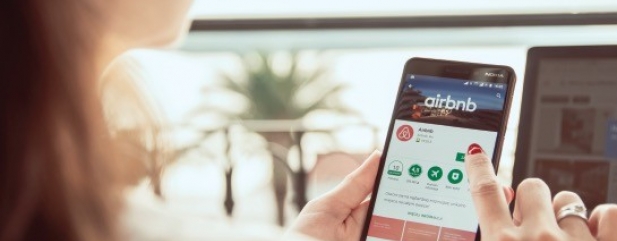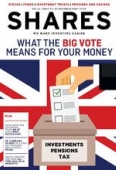Archived article
Please note that tax, investment, pension and ISA rules can change and the information and any views contained in this article may now be inaccurate.
Is the Government about to remove the lucrative Airbnb tax break?

The Government could crack down on a lucrative tax break exploited by those using Airbnb and other home-sharing websites, as the cost of the giveaway has soared in recent years.
There has been a surge in the number of people using the rent-a-room relief, which allows you to earn money tax free by renting out your home. Government figures show there has been a near-50% increase in the number of people using the relief, from 150,000 in 2016/17 to 220,000 in 2017/18.
The Government has also had to upwardly revise its estimates of how much the tax break will cost the public purse – by more than 60%. In the Government’s costings documents released in January this year, they expected the relief to cost £140m for 2017/18 tax year, but instead the tax break cost £210m.
For the current tax year the Government originally estimated the tax break would cost £150m, but revised figures last month show it now thinks it will be closer to £230m – a 60% jump. It has predicted another increase next year to £240m.
HOW DOES THE TAX BREAK WORK?
Rent-a-room relief gives a tax break to individuals who let furnished rooms in their only or main home. It means that the first £7,500 a year generated in rent is tax free, rather than being taxed as income.
For a basic-rate taxpayer this saves £1,500 in tax a year, while for a higher-rate tax payer it saves £3,000 in tax a year, and an additional rate tax payer saves £3,375 a year.
The relief was introduced in 1992 to encourage people to take in a lodger and rent out their spare rooms, in order to boost available housing. It was never intended for people to make some quick cash by renting out their home for two weeks while they went on holiday.
In recent years it has been used increasingly by people who rent out their home on Airbnb, or other home-sharing websites, typically to tourists. Sometimes they will live in the property and just rent a spare room, but often they will rent out the entire property, such as while they are on holiday, or an entire second property.
PREVIOUS CRACK DOWN
The Government previously released plans to crack down on the use of this tax break by the army of people using Airbnb to make extra income.
It planned to bring in new rules that would restrict the broad application of the tax break. The change would have meant that people had to live in the property for at least some of the time during the period it was rented out.
By rewording the rules, this would stop people using the tax break when they were renting out a second property. It would also make it harder for people who wanted to rent out their entire home while they were on holiday, as they would have to live in the home alongside the renters for some of the time it was rented out.
The change was due to be introduced from 6 April 2019, but was scrapped as part of the rush to get the Finance Bill through parliament ahead of the last snap general election.
Since then the Government has been too focused on Brexit since to reintroduce the rules. However, the big spike in the cost of the tax break could mean it comes under the Government’s radar once again.
Which unusual tax breaks cost the most?
The Government’s documents on how much different tax breaks cost may appear like a dull long spreadsheets, but they include some weird and wonderful facts about lesser-known tax breaks that exist, and what costs the most.
Seafarers’ earnings deduction
This tax break is estimated to cost the Government £260m in the current tax year. It’s a tax break for people working at sea, outside of the UK. If you worked on a ship and were out of the UK for a year or more, you can get tax relief on your earnings.
Tax breaks on redundancy pay
This tax break costs the Government £600m each year. It gives those who have been made redundant the first £30,000 of any compensation pay tax free. This tax break doesn’t count for holiday pay or payment in lieu of notice.
Professional subscriptions
People who have to pay fees and subscriptions to certain professional organisations each year may not realise they can claim the tax back – but only if
it relates to their job. This tax break is estimated to cost the public purse £145m this year.
Small brewers relief
Lots of people have enjoyed the boom in micro-breweries in recent years, but not all realise these firms get a tax break, expected to cost £65m this year. It means breweries that produce less than 5,000 hectolitres (about 900,000 pints) a year
get a 50% discount on beer duty.
Video games relief
Expected to cost £115m, this allows companies involved in designing, developing, testing and producing video games to apply for a corporation tax break. There are lots of these industry-specific tax breaks, including for companies involved in animation, TV dramas and children’s TV programmes.
And the priciest tax break is…
VAT breaks on food
Expected to cost £18.9bn in the current tax year, this means no VAT is charged on most unprocessed food and cold food for take-away.
Important information:
These articles are provided by Shares magazine which is published by AJ Bell Media, a part of AJ Bell. Shares is not written by AJ Bell.
Shares is provided for your general information and use and is not a personal recommendation to invest. It is not intended to be relied upon by you in making or not making any investment decisions. The investments referred to in these articles will not be suitable for all investors. If in doubt please seek appropriate independent financial advice.
Investors acting on the information in these articles do so at their own risk and AJ Bell Media and its staff do not accept liability for losses suffered by investors as a result of their investment decisions.

 magazine
magazine










